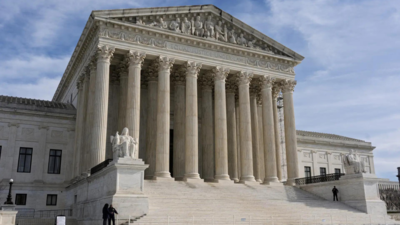
The US Supreme Court in Washington (File photo)
The US Supreme Court delivered two rulings in favour of the Trump administration on Friday regarding Department of Government Efficiency cases, including permitting access to Social Security databases with personal details of millions of US citizens.
The court also limited transparency requirements for DOGE, formerly headed by Elon Musk.The court's conservative majority supported the administration in these first Supreme Court appeals concerning DOGE, while the three liberal justices opposed both decisions, reported the Associated Press.These DOGE rulings emerge during a contentious falling out between the president and Musk following his White House departure, involving threats to terminate government contracts and impeachment demands.
Despite both individuals confirming DOGE's continuation, its future direction remains uncertain without Musk's leadership.In one ruling, the court suspended a Maryland judge's order limiting the team's Social Security Administration access under federal privacy regulations. "We conclude that, under the present circumstances, SSA may proceed to afford members of the SSA DOGE Team access to the agency records in question in order for those members to do their work," stated the court's unsigned order.
Conservative lower-court judges noted no current evidence of DOGE mishandling personal data.The agency maintains sensitive information about most Americans, including educational, financial and medical records.Justice Ketanji Brown Jackson warned that the ruling creates "grave privacy risks" for millions by granting "unfettered data access to DOGE regardless- despite its failure to show any need or any interest in complying with existing privacy safeguards, and all before we know for sure whether federal law countenances such access."
Justice Sotomayor supported Jackson's position; Justice Kagan also opposed the administration's stance.The administration maintains DOGE requires access to fulfil its government waste reduction mission. Musk had prioritised Social Security, which he labelled a "Ponzi scheme", emphasising waste reduction as crucial for decreasing government expenditure.Maryland District Judge Ellen Hollander deemed DOGE's Social Security investigations a "fishing expedition" based on minimal fraud evidence, noting unrestricted access endangers Americans' privacy.Her decision permitted trained, vetted staff to access anonymous data, with broader access granted upon demonstrating specific requirements. The administration contends these limitations impede DOGE's effectiveness. Solicitor General D. John Sauer argued the ruling exemplifies judicial overreach into executive agency management. The plaintiffs maintain the order's narrow scope is essential for protecting personal information.An appeals court previously maintained the DOGE access restriction, though ideologically divided. Conservative minority judges noted no evidence of "targeted snooping" or personal data exposure.Labour unions and retirees, represented by Democracy Forward, initiated the lawsuit. It joins numerous legal challenges to DOGE's activities, including agency cuts and staff redundancies.The judicial system has become central to challenging President Trump's conservative agenda, facing approximately 200 lawsuits on policies ranging from immigration to federal worker dismissals.In Friday's other DOGE ruling, the justices extended a stay on orders requiring operational transparency, stemming from a government watchdog group's lawsuit.Citizens for Responsibility and Ethics in Washington argues DOGE's federal agency status requires Freedom of Information Act compliance.The administration maintains DOGE's advisory status exempts it from FOIA requirements.While not resolving this issue, the conservative majority determined District Judge Christopher Cooper's document disclosure order was overly broad.

 16 hours ago
58
16 hours ago
58




























 English (US)
English (US)